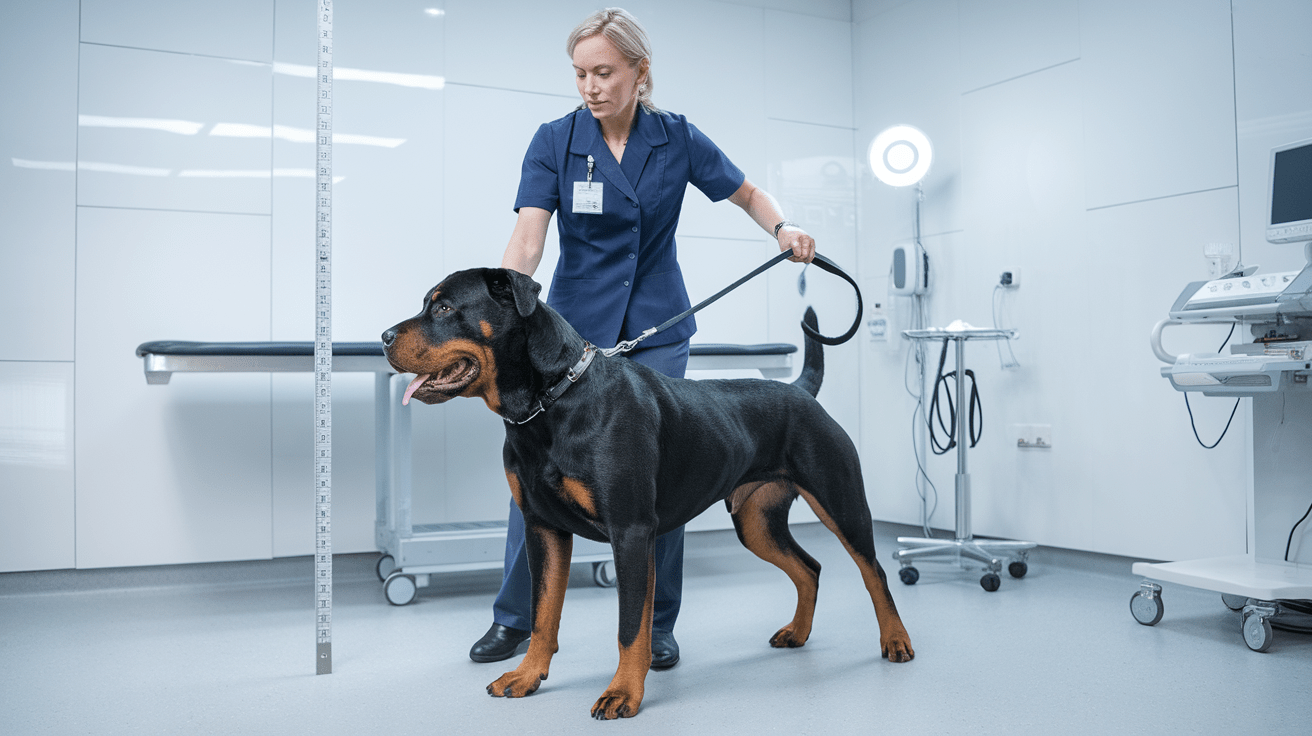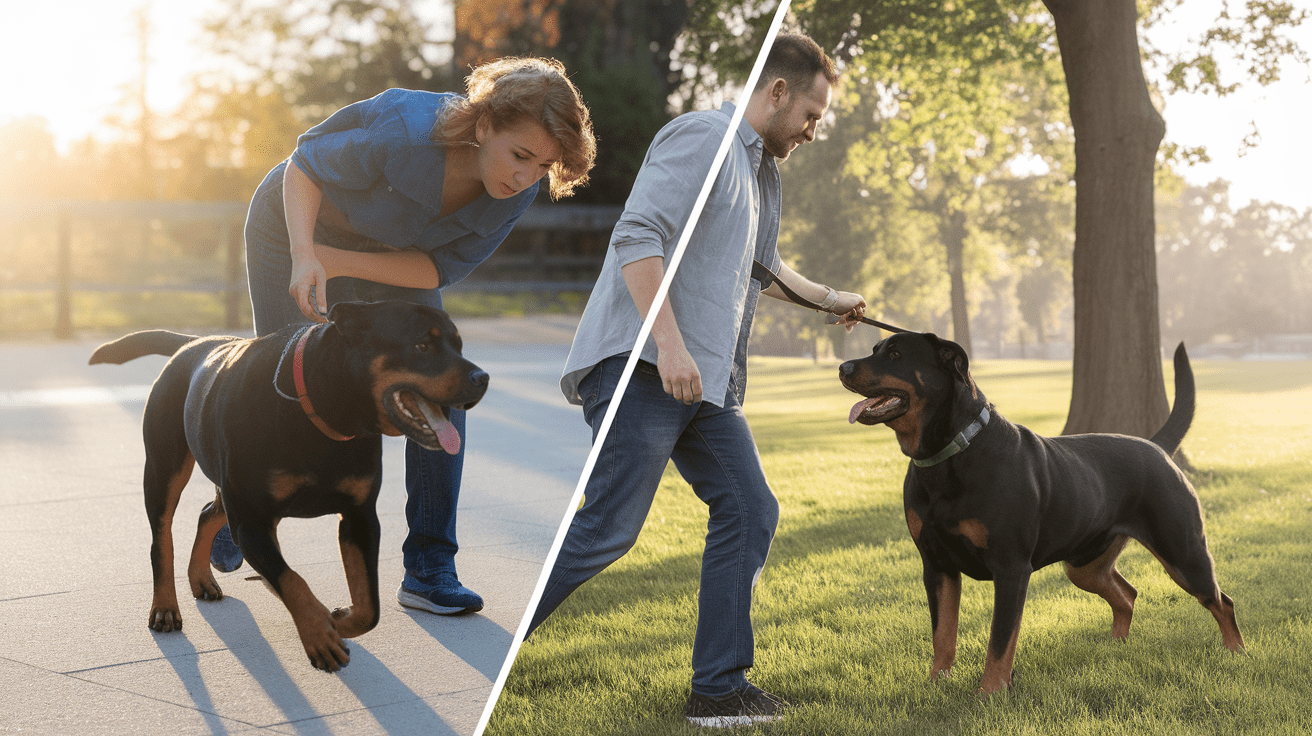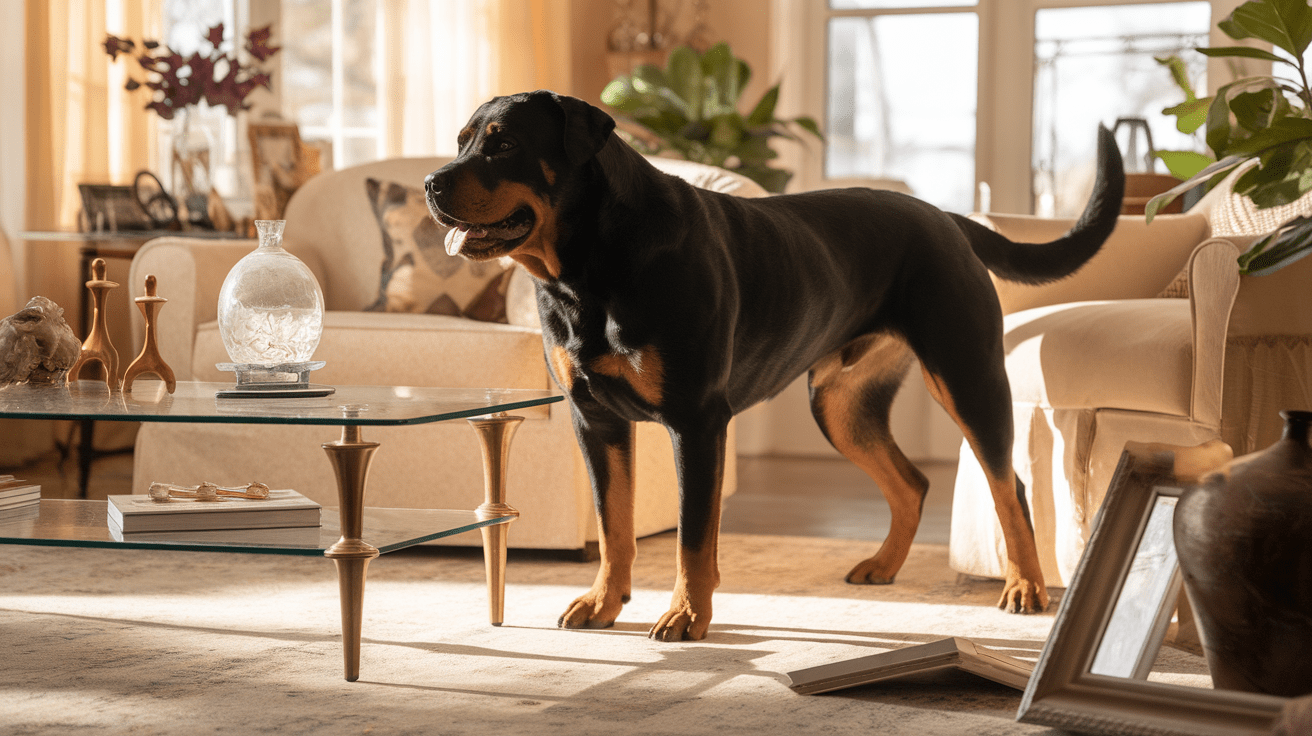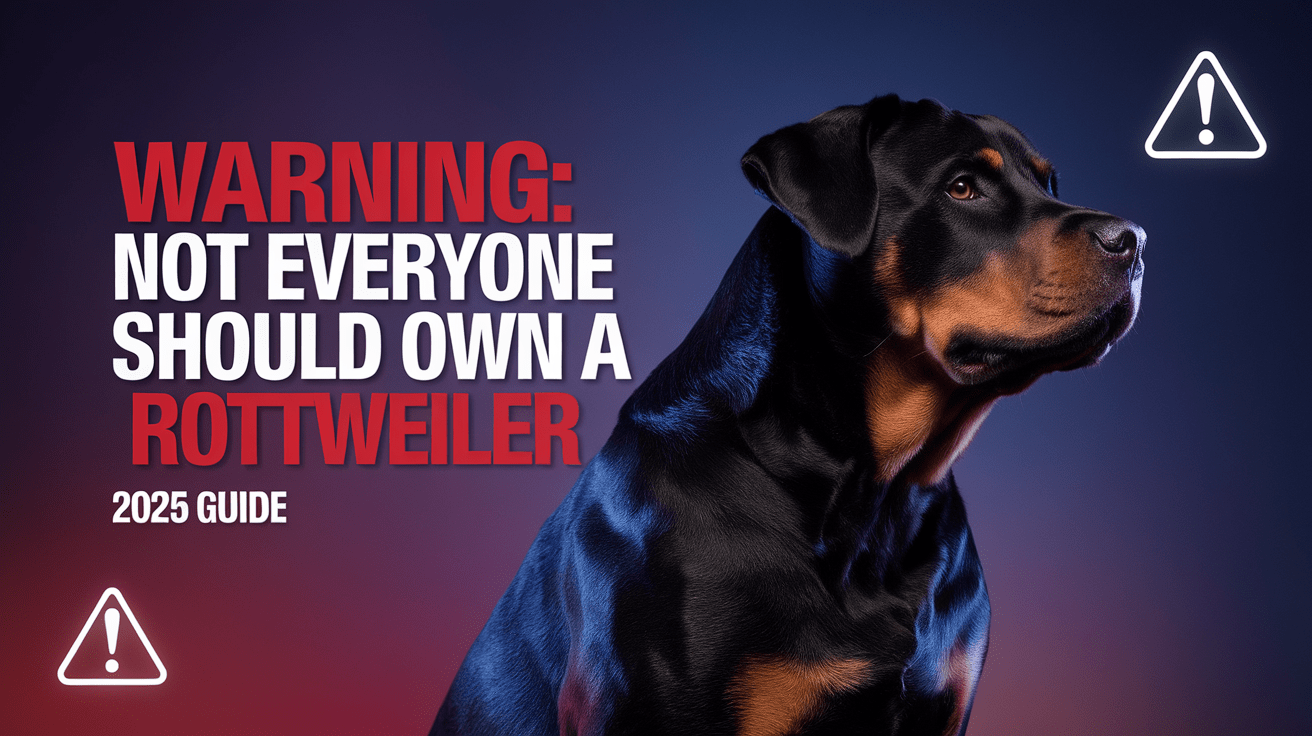Who Should Not Own a Rottweiler? Key Takeaways
- ✓ Physical Capabilities: People with limited strength or mobility issues should avoid Rottweilers, as these dogs can pull with forces exceeding 300 pounds.
- ✓ Living Space: Those in small apartments or homes without yards aren’t suitable, as Rottweilers need at least 1000 square feet of outdoor space.
- ✓ Time Commitment: Individuals working long hours or rarely home shouldn’t own Rottweilers, as they require at least 2 hours of daily exercise and interaction.
- ✓ Experience Level: First-time dog owners should consider other breeds first, as Rottweilers require experienced handling and consistent training.
- ✓ Household Composition: Homes with very young children, elderly members, or multiple small pets may face challenges with Rottweilers’ size and strength.
Are you considering adding a Rottweiler to your family? While these powerful and intelligent dogs make incredible companions, they’re not the right fit for everyone. According to the American Kennel Club, Rottweilers rank among the top 10 most powerful dog breeds, capable of pulling up to 6 times their body weight.
As a veterinarian and long-time Rottweiler owner, I’ve seen countless situations where this magnificent breed’s needs didn’t align with their owners’ capabilities. These mismatches often lead to challenging situations for both the dog and the family. Before you fall in love with those adorable Rottie eyes, let’s explore why certain individuals might want to consider a different breed. From physical demands to lifestyle compatibility, understanding these factors is crucial for both your happiness and the well-being of your potential furry friend.
Physical and Lifestyle Factors That Make Rottweiler Ownership Challenging

In my veterinary practice, I’ve encountered numerous situations where owners underestimated the physical demands of raising a Rottweiler. These powerful dogs typically weigh between 80-135 pounds, and according to Vetstreet, they can exert pulling forces of over 300 pounds when excited. Let’s examine why certain physical and lifestyle factors might make Rottweiler ownership particularly challenging.
People with Limited Physical Strength or Mobility Issues
Managing a full-grown Rottweiler requires significant physical strength and stability. During my years of practice, I’ve treated several owners who suffered injuries simply because they couldn’t control their Rottweiler during an excited moment. Think of it like trying to hold back a professional athlete – even with proper training, their natural strength can be overwhelming.
Those Living in Small Apartments or Homes Without Yards
Rottweilers need space – not just for physical exercise but for mental stimulation too. Living in confined spaces can lead to destructive behaviors. I once treated a Rottie named Max who developed anxiety issues from living in a studio apartment. These dogs need room to stretch, play, and patrol their territory.
Consider these space requirements:
• A secure, fenced yard of at least 1000 square feet
• Dedicated indoor space for a large crate or bed
• Room for interactive play and training sessions
Individuals Who Work Long Hours or Are Rarely Home
Rottweilers form intense bonds with their families and can develop separation anxiety when left alone for extended periods. During my early years of practice, I witnessed how prolonged isolation affected these social animals. They need:
• Regular human interaction throughout the day
• At least 2 hours of dedicated exercise and training daily
• Consistent meal times and bathroom breaks
If you’re consistently away for more than 8 hours daily, consider that Rottweilers aren’t like more independent breeds such as cats. They thrive on companionship and need regular engagement to prevent behavioral issues. Without proper time investment, even the best-intentioned owner might struggle to meet a Rottweiler’s social and exercise needs.
Personal Characteristics That Don’t Match Rottweiler Ownership

Having supervised countless Rottweiler adoptions over my career, I’ve identified certain personal traits that often clash with successful Rottweiler ownership. According to the ASPCA, behavioral issues account for nearly 47% of dog surrenders, with strong breeds like Rottweilers being particularly affected when owner characteristics don’t align with breed needs.
First-time Dog Owners Without Breed Experience
While every dog owner starts somewhere, Rottweilers aren’t ideal “starter dogs.” They require an understanding of canine behavior that comes with experience. I remember counseling a family who had never owned a dog before – they were overwhelmed within weeks by their Rottweiler puppy’s strong personality and training needs. Consider gaining experience with more forgiving breeds first.
People Who Can’t Commit to Consistent Training
Rottweilers need structured, ongoing training – not just a few basic classes. Think of training a Rottweiler like learning a musical instrument; sporadic practice won’t lead to mastery. They require:
• Daily training sessions (15-30 minutes minimum)
• Consistent rules and boundaries
• Early socialization opportunities
• Regular mental stimulation exercises
Those Who Lack Assertiveness or Natural Leadership Qualities
Rottweilers naturally test boundaries and respect confident leadership. In my practice, I’ve seen gentle-natured owners struggle when their Rottweiler assumes the alpha role. These dogs need someone who can:
• Set clear boundaries without aggression
• Maintain calm authority in challenging situations
• Make decisions confidently and consistently
Individuals with Poor Financial Stability for Care Costs
The financial commitment of owning a Rottweiler extends far beyond the initial purchase price. As a veterinarian, I’ve seen owners face difficult decisions when unexpected medical expenses arise. These powerful dogs require:
• Regular veterinary check-ups and preventative care
• Quality nutrition (often 4-6 cups of premium food daily)
• Professional training support
• Potential insurance costs due to breed classification
Remember, owning a Rottweiler is like managing a small business – it requires investment, dedication, and the right personal qualities to succeed. Without these characteristics, both owner and dog may face unnecessary challenges and stress.
Living Situations That Are Incompatible with Rottweilers

Through my years of veterinary practice, I’ve observed certain living situations that consistently present challenges for Rottweiler ownership. According to the Animal Humane Society, large breeds like Rottweilers require careful consideration in multi-member households, as they account for approximately 30% of dog-related incidents in complex family settings.
Households with Very Young Children or Elderly Family Members
While Rottweilers can be gentle giants, their size and strength pose unintentional risks. I once treated a family’s Rottweiler who accidentally knocked over an elderly grandmother during an excited greeting. Consider these factors:
• A fully grown Rottweiler’s weight can match that of an adult
• Their tail-wagging alone can knock small children off balance
• Quick movements from young children might trigger herding instincts
Homes with Multiple Small Pets or Other Dominant Dogs
Rottweilers have a strong prey drive and can be territorial with other dogs. In my practice, I’ve helped numerous families navigate the challenges of introducing a Rottweiler to existing pets. Think of it like bringing a linebacker to a chess club – the dynamics can be overwhelming. They need:
• Careful supervision around smaller animals
• Proper introduction protocols with other dogs
• Separate spaces when unsupervised
Locations with Breed-Specific Legislation Against Rottweilers
Before considering a Rottweiler, research your local laws thoroughly. I’ve witnessed the heartbreaking reality of families forced to rehome their beloved Rottweilers due to housing restrictions or local regulations. Be aware of:
• Housing association rules
• City or county breed restrictions
• Insurance company breed limitations
• Rental property policies
Remember, a successful Rottweiler household requires the right combination of space, family composition, and legal compliance. Like planning for a major life change, thoroughly evaluating your living situation before bringing home a Rottweiler can prevent future complications and ensure a harmonious relationship with these magnificent dogs.
Frequently Asked Questions About Who Should Not Own a Rottweiler
Final Thoughts: Making the Right Choice
While Rottweilers are extraordinary companions for the right owners, it’s crucial to make an honest assessment of your situation before committing to this powerful breed. As a veterinarian, I’ve seen both incredible successes and heartbreaking failures in Rottweiler ownership. The key lies in understanding that these dogs require a unique combination of physical capability, time commitment, and emotional readiness. If you’ve identified potential challenges in your situation, consider exploring other breeds that might better match your lifestyle. Remember, responsible pet ownership isn’t about choosing the dog you want, but rather choosing the dog whose needs you can fully meet. The right match ensures a lifetime of joy and companionship for both you and your canine friend.
For those committed to Rottweiler ownership, proper training is absolutely essential for success. Our detailed Rottweiler Training Guide offers expert guidance on everything from basic puppy training to advanced behavior modification techniques. Understanding and implementing these training principles early on can help prevent many of the challenges discussed above and create a strong foundation for a lifelong bond with your Rottweiler.







